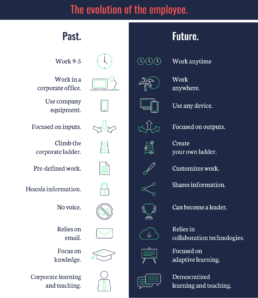The work world is changing. And in parallel, the mentality linked with the work is also changing. It is impossible to understand which of the two changes is the cause or result of the other: they happen simultaneously.
The work changes due to the development of new technologies, the generation of new needs, the development of new professional horizons.
The mentality changes because this generation sees the work world in a completely different way than generations of the past: new beliefs are born, with different desires and expectations that no one defined before.

Source: Jacob Morgan – The Future of Work
A new vision of work.
According to a study conducted by Jointly in collaboration with Università Cattolica di Milano, for Millenials, wellbeing inside and outside the office is more important than earnings. Platform Comparably adds that 34% of under 35s prioritize their own wellbeing and personal balance over career advancement.
The idea of success is different now from what it was a few years ago: it is no longer the realisation of an exclusively professional goal, but rather achievement of an optimum balance between personal and professional evolution.
The mentality of the individual changes, but not the mentality that companies operate by: this is the obstacle. Companies mustn’t fear change, but rather embrace and channel it in the best way.
“Intelligent” work.
An example of change that has been underway for some time, and that is still not appreciated by everyone is Smart Working. Smart Working means, following the definition of the Chartered Institute of Personnel and Development (CIPD), an approach to work that focuses on greater efficiency and effectiveness in reaching goals through flexibility, autonomy and collaboration. It doesn’t involve simply “working from home”: it is a wider concept that will be addressed at another time. But let’s take a look at the statistics.Smart Workers in Italy currently number 480,000. 50% of these feel fully satisfied with their work, in comparison with an average of 22% of those who work in a traditional manner. The 34% of Smart Workers declare having good relations with colleagues and superiors, and almost none of them are completely dissatisfied with their work.
In addition to their point of view, we can also analyse the question from the company point of view: companies with a good smart working plan, productivity is elevated by 15%, the absentee rate is lower than 20% and the quality of work significantly improves.
Lifelong learning.
Another point worth mentioning regarding training: the focus is no longer on previous and learned knowledge, or so-called “experience”. The attention shifts to progress and constant and continuous growth. Nobody can ever say they have “arrived”, in the professional sense. There’s always something new to learn: we talk about lifelong learning.
Speaking of growth, today the value of the person is considered more important than that of the skill. “The only capital available has become the “here and now” and one’s own self, seen as an asset to promote and to enjoy, “ says Giovanni Siri, professor of Psychology at Università San Raffaele di Milano. People are therefore called upon to build their careers based on their needs and personal, as well as professional objectives. The possibility of success, in fact, is open to a wider range of people, and training is available to everyone.
We live in a time of change, technological development and change of outlook, and the “future” is closer than ever: the centrality of the person is increasingly necessary and significant.
SHARE!

